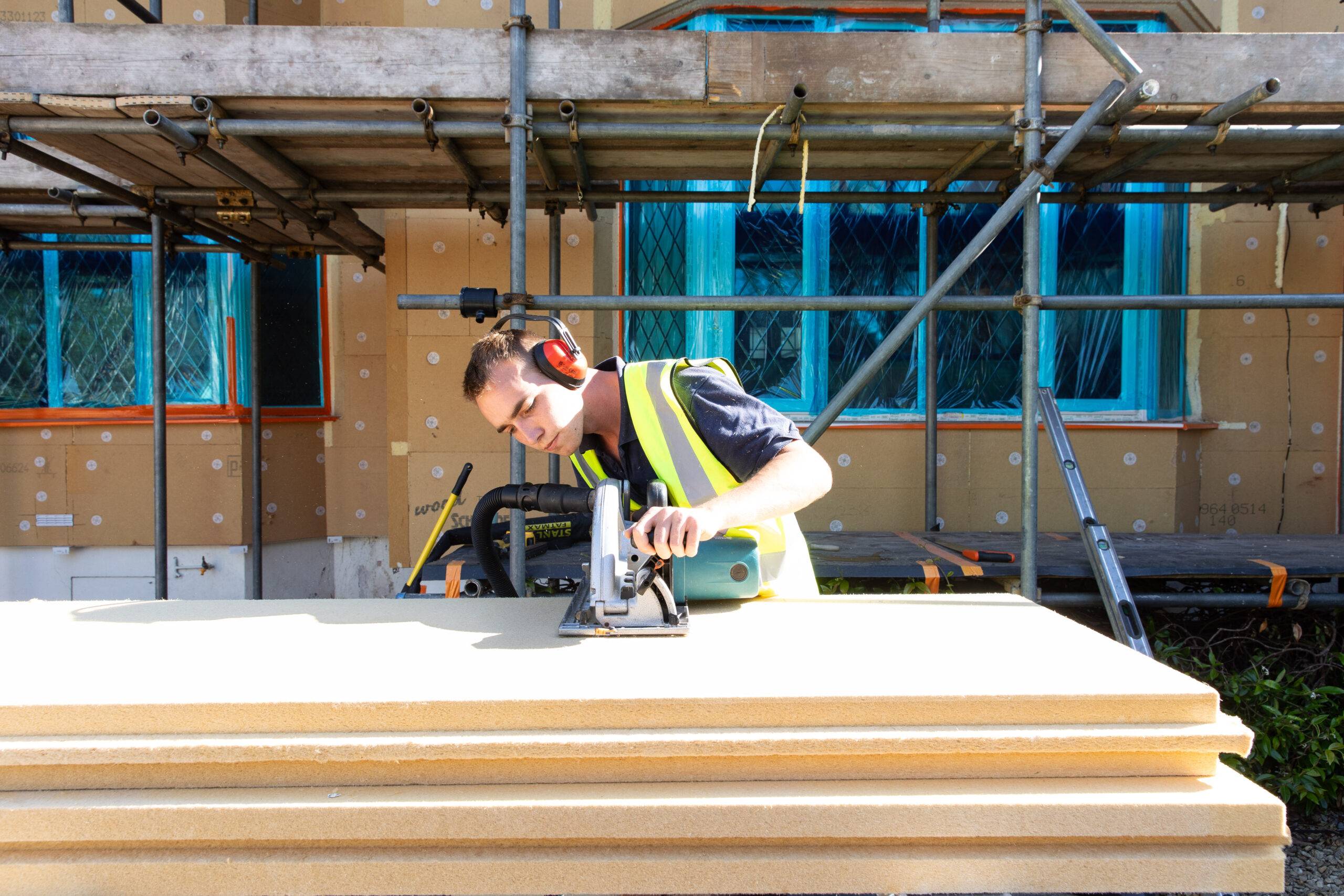Construction skills in domestic retrofit
Guidance on the opportunities for construction trades in the domestic retrofit sector.

Construction skills are important to retrofitting domestic buildings. This guide offers information on entry routes into construction careers as well information on how experienced professionals in the industry can broaden their career with further training in retrofit.
The demand for retrofit in construction
At least 58% of the 500,000 homes in the West of England need to become more energy efficient to meet our net zero emission targets. This presents exciting job opportunities for local residents and businesses in the construction industry. To fulfil our net zero ambitions, the industry will need to increase the number of skilled professionals for a variety of roles such as energy advisers, project managers, surveyors, architects, digital designers and insulation installers.
Insulation is an important area of retrofit as it helps to control the heating and cooling of homes, examples include cavity wall, solid wall or roof and loft insulation. By better insulating our homes, we can significantly reduce energy consumption and emissions used to heat or cool rooms. A regional retrofit market report estimated the region will need an additional 1,300 to 7,400 installers to fulfil our 2030 net zero ambitions. This indicates the scale of demand and expected growth in the sector.

Entry routes into the industry
Apprenticeships combine practical training with work through a paid job alongside formal study. There are over 100 construction-related apprenticeships across various levels and skill interests. The level and length of your apprenticeship will depend on your existing experience and qualifications. Common ways to enter construction is through a ‘multi-trade’ apprenticeship or taking up a specialism, such as:
- Carpentry / Joinery
- Bricklaying
- Plastering
- Plumbing (visit our plumbing and heating careers page)
- Electrical (visit our electrical careers page)
- Computer Aided Design (CAD)
The new Low-Carbon Heating Technician Apprenticeship offers training to directly enter the retrofit industry:
Course: Level 3 Low-Carbon Heating Technician Apprenticeship
Length: Usually 3-4 years
Eligibility: Individual employers will set their own entry requirements, but this will typically include English and Maths at GCSE Grade C or above. Apprentices without English or Maths Level 2 must achieve this by the end-point assessment of the course.
Further Opportunities: Employment, higher apprenticeship, or expand into further areas of retrofit skills training (see next section on Further Training in Retrofit).
Our Skills Connect pages can help you to find construction courses as well as learn more about apprenticeships. For more specific information on construction apprenticeships, visit Go Construct
Colleges offer a variety of training options in different areas of construction. Courses can last for weeks or years, and either full-time or part-time. Short courses are a way of exploring a new career in construction or to learn new skills around other commitments. For example:
Course: Carpentry Taster or Brickwork Taster
Length: 6 weeks
Eligibility: 19+ (no formal entry requirements)
Formal courses are available in specific specialisms as well as generic construction courses whereby you can gain both knowledge and practical experience in a variety of trades. For example:
Course: Foundation Construction Skills (also includes either enrolment onto Functional Skills or GCSE programmes in English and Maths to progress towards a GCSE grade 4 in both subjects).
Length: One year (full-time)
Eligibility: All ages. GCSE English and Maths at Grade 2+
Further Opportunities: Learners who successfully complete will be eligible for progression onto a Level 2 programme of study or an apprenticeship in a related discipline
T levels are also an option for young people aged 16-19, offering study with a hands-on work placement experience. There are multiple T level courses in construction, one example is:
Course: T Level in Design, Surveying and Planning for Construction (Level 3)
Length: 2 years
Eligibility: 16-19-year-olds, usually requires 4-5 GCSEs at grades 9 to 4 (A* to C) or equivalent, including English and Maths
Further Opportunities: T-levels earn UCAS points which could help you progress to Higher Education such as a degree in Architecture. You could also progress to employment or a traineeship; undertaking an accelerated or higher apprenticeship, or expand your skillset into retrofitting (see next section: Further Training in Retrofit). For more information, view the progression profile provided by the Institute for Apprenticeships and Technical Education.
For more information on the different training routes, visit the Go Construct website.
Gaining work experience or engaging in paid employment provides valuable opportunities to shadow skilled professionals and assist them with daily tasks. In the construction industry, for instance, workers often need a Construction Skills Certification Scheme (CSCS) card and must pass the CITB Health, Safety and Environment Test to work on-site, although this is not a legal requirement (visit the Construction Industry Training Board for more information). Numerous training courses are available to help you enter the workforce and obtain essential certifications, including the CSCS card and Health and Safety training. For example:
Course: SWAP in Construction (linked to local employers, with guaranteed interviews)
Length: 2 weeks
Eligibility: Free for unemployed, or those in work earning less than £21,255 per annum
Further opportunities for experienced workers: Your employer may support you to train to become fully qualified through an apprenticeship (see above). Formalising your work experience with industry-recognised qualifications can both broaden employment prospects and increase further training opportunities.
Further training in retrofit
Learn how to make homes more energy-efficient by installing insulation. You can read more about the types of insulation on the Energy Savings Trust’s website.
Example training:
Course: Level 2 Award in External Wall Insulation and Finishes (online)
Length: Self-paced short course
Eligibility: The minimum requirement for entry is a Level 1 in Health and Safety.
View a list of insulation training providers in our Skills Connect directory.
There are a variety of courses designed to teach the basic principles of retrofit. These types of courses can also help identify further areas of interest in retrofit. Some examples are:
Informal Training:
Course: Retrofit 101 (online)
Length: 2 hours
Eligibility: Open to everyone and free.
Formal Training:
Course: Level 2 Award Understanding Domestic Retrofit (online)
Length: 30hours (self-paced)
Eligibility: Open to everyone.
You can view a range of training providers offering retrofit courses in our Skills Connect directory.
Learn how to conduct home Energy Performance Certificates (EPCs) as a qualified Domestic Energy Assessor. All offer opportunities to enter the industry or add another skill to add to your existing work. Here are some example courses:
Example Domestic Energy Assessor course:
Course: Level 3 Award in Domestic Energy Assessment
Length: Days-Weeks depending on the course
Eligibility: No previous qualifications or experience required
Further Opportunities: As an Energy Assessor you can go on to become a Retrofit Assessor (see next section 'Retrofit - New Roles) or become qualified in assess heritage buildings (see next section below)
Further assessment-related courses offer training in how to survey and assess a building, calculate the heat loss, and specify the design requirements of a heat pump installation.
Course: ABBE Level 3 Certificate in Surveying and Calculation of Building Heat Loss
Length: 3 days (online)
Eligibility: None (aimed towards Domestic Energy Assessors)
You can view a range of training providers offering courses in Energy Efficiency in our Skills Connect Directory.
With a quarter of the UK retrofit housing market considered old and traditional buildings, this course enables you to expand your energy assessment services to these older buildings:
Course: Level 3 Award in Energy Efficiency for Older and Traditional Buildings
Length: Usually 2 days (online)
Eligibility: Working within an energy assessment role
View a range of training providers offering retrofit training in all these areas and more in the Skills Connect Directory.
New job roles have been developed to support the retrofitting process, along with specific training requirements. Note many of these courses are partially or fully funded. Below are the job roles and examples of relevant training:
Retrofit Assessor Role
Completing property surveys to improve energy efficiency.
Training: Skills Bootcamps - Level 4 Award in Domestic Retrofit Assessment
Length: Usually 60 hours across 10 weeks (online)
Eligibility: Level 3 Domestic Energy Assessor qualification (if you do not have this already there are combined courses available).
Retrofit Advisor Role
Providing independent advice to residents on how to retrofit their home.
Training: Level 3 Certificate in Domestic Retrofit Advice
Length: 30 hours (online)
Eligibility: 18+ years
Retrofit Coordinator Role
Retrofit Coordinators manage retrofit projects including procurement, specification, and delivery.
Training: Skills Bootcamp - Level 5 Diploma in Retrofit Coordination and Risk Management
Length: 103 hours across 13 weeks
Eligibility: A Level 3 qualification in the built environment
View a range of training providers offering retrofit training in all these areas and more in the Skills Connect Directory.
Job profiles
- Specialist Skills: Risk Management, Project Management, Auditing, Building Controls, Construction
- Retrofit Coordinators can work for themselves or be employed by a company
- Soft Skills: Management, Coordinating, Communicating, Detail-oriented, Presentation
- Commonly advertised salary: £43K
- Specialist Skills: Thermography, Site assessment, Energy modelling, Performance reporting
- Domestic Energy Assessors can work for a company or existing trade workers could offer energy assessments as an additional service.
- Soft Skills: Communication, Detail-oriented, Self-motivated, Positivity, Coordinating
- Salary range: £18-35K
Finding Support
Professional organisations offer industry specific support, such as career advice, training, membership schemes, and networking opportunities, as well as support with industry regulations or developments. Here are some organisations relating to the construction industry and retrofit:
RetrofitWest are the local service set up to support the development and growth of the retrofit market in the West of England. They offer advice and guidance, events, networking, fully and partially funded courses, as well as a directory of local retrofit professionals to link customers and suppliers together.
Construction Industry Training Board (CITB) are the national training board for the construction industry. As well as course and apprenticeship information they offer lots of different grant schemes.
Institute for Apprenticeships and Technical Education offer a detailed interactive map of courses at different levels of study.
Chartered Institution of Building Services Engineers promotes the careers of building services engineers by accrediting courses of study in further and higher education, by approving work-based training programmes and providing routes to full professional Registration and Membership.
Federation of Master Builders is the largest trade association in the UK construction industry representing the interests of small and medium-sized building companies and lobbying for members at both national and local levels.
Home Builders Federation is the representative body of the home building industry in England and Wales. The HBF’s member firms account for some 80% of all new homes built in England and Wales in any one year, and include companies of all sizes, ranging from multi-national, household names through regionally based businesses to small local companies
The Insulated Render and Cladding Association (INCA) is the recognised trade association for the External Wall Insulation (EWI) industry, representing the major system designers, a nationwide network of specialist installers and key component suppliers
The Institute of Carpenters include a Student Hub section of their website offering information on related skills including bursaries, awards, apprenticeships, and starting your own business.
Royal Institute of British Architects is a global professional membership body driving excellence in architecture, setting standards both in the education of architecture students and the continuing professional development of architects. Their website includes information about training, jobs and bursaries.
Training Grants
The Construction Industry Training Board provide grants for employers who provide training for their workforce. If you are an employer or work for an eligible employer you may be able to access the grant scheme.
Explore further pathways into domestic retrofit
Explore some of the other career pathways in domestic retrofit, for new starters or experienced professionals looking to train up.

Talk to a friendly advisor
Feeling overwhelmed or not sure where to start? We’re more than a website, we have real people waiting to help with all your skills, training and career needs.